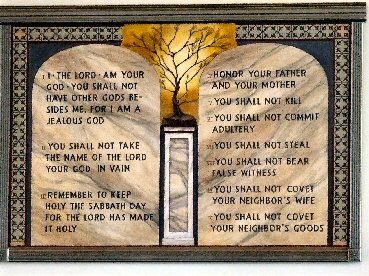The
Old Testament
Return to
Glory to the Father
Divine Law - God's
will made known to man through the Prophets and Revelation
I
The Mosaic Law identified in the Old Testament of the Bible
as the Divine Law
is contained in the Pentateuch (first
five books in Bible - Genesis, Exodus, Leviticus, Numbers,
Deuteronomy).
 A. Mosaic Law was
revealed by God to Moses c.a. 500 B.C. and was composed
of:
A. Mosaic Law was
revealed by God to Moses c.a. 500 B.C. and was composed
of:
Civil
Law - Regulated relations among the People of God and their
neighbors.
Ceremonial
Law - Regulated matters of religion and worship of God.
B. Moral Law (Higher Law) -
Divine Code of Ethics containing the universal principles
of
fairness, morality and justice.
C. Natural Law - Codified in the Ten
Commandments. Written in the hearts of man.
We
know what we must do / what we must avoid.
Do to others
what you would have them do to you (Golden Rule).
D. Gathered from
nature.
E. Summed up in the Decalogue
(Exodus, Leviticus, Deuteronomy). Inspired by God,
promulgated by Moses.
F. Parts known long before
Moses wrote them down. The basis of all true
civilization.
G. Standard for the Jewish
Nation &
Christianity.
The Ten Commandments:
 I
I the Lord am your God, you shall not have other gods
besides me,
I
I the Lord am your God, you shall not have other gods
besides me,
for I am a
jealous God.
II You shall not take the
name of the Lord your God in vain.
III Remember to keep holy the Sabbath
day for the Lord has made it holy.
IV Honor your father and your
mother.
V You shall not kill.
VI You shall not commit
adultery.
VII You shall not steal.
VIII You shall not bear false
witness.
IX You shall not covet your
neighbor's wife.
X You shall not covet
your neighbor's goods.
Note: The
Mosaic Civil Law contained imperfections but was suited to the
low stage level of civilization at that time.
Foreign residents treated fairly.
Absence of torture and
mutilation.
Punishment for transgressors.
Fewer cases of capital punishment than other societies.
Material rewards result from God's pleasure, i.e. wealth, large
family, good health, success in
battle/business, public esteem for followers and long life.
Note: The
Mosaic Civil Law was Superior to other codes of Civil Law at
that time.
Babylonia - Code of Hammurabi c.a. 1790 B.C., An eye for
an eye, a tooth for a tooth.
Assyrian Laws - Code of Assura c.a. 1075 B.C.
Hittite Laws c.a. 1500-1400 B.C.
Sharia Laws (Islamic Laws) c.a. 570 B.C.
Draconian Constitution c.a. 700 B.C.
Manusmriti
c.a. 200 B.C.
Twelve
Tables of Roman Law c.a. 451 B.C.
 A. Mosaic Law was
revealed by God to Moses c.a. 500 B.C. and was composed
of:
A. Mosaic Law was
revealed by God to Moses c.a. 500 B.C. and was composed
of:  I
I the Lord am your God, you shall not have other gods
besides me,
I
I the Lord am your God, you shall not have other gods
besides me,